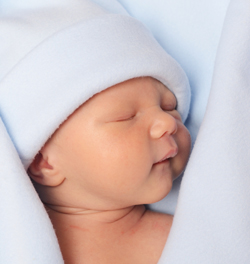Baby Sleep Patterns

On average, most newborn infants sleep about sixteen and a half hours per day, but some may sleep as little as nine hours, and others as much as twenty-two hours per day. Infants tend to sleep for short periods of about two hours, and then wake for about thirty minutes before falling back to sleep. Others may nap for shorter periods while some may soon sleep for stretches of five or six hours. The parents of a newborn are likely to have their own sleep patterns upset. This is normal and with time, baby will nap less often, but for increasingly longer periods. By about the sixth month, babies will likely sleep through the whole night and remain awake much of the day.
Ensuring Good Sleep Patterns/Habits: The Earlier the Better
Sleep problems are among the most common complaints that parents have about their young children. Needless to say, they can cause a lot of stress in the family. Typically, children with sleeping problems do not fall asleep easily and also wake up in the middle of the night. Whether a sleep pattern or habit is abnormal depends on the age of the child. Sleep patterns in babies take time to develop into normal sleep cycles of being asleep for the full night and awake during the day. In fact, most babies do not develop normal sleep patterns, until about four to six months of age.
Most sleep problems develop when parents react too quickly to a child who is fussy at night, not realising that baby, if left alone for a few minutes, may indeed fall asleep by herself. When a parent reacts immediately to a first cry, baby gets used to being comforted. Not surprisingly, the baby soon learns to expect attention immediately. NOTE: When I discuss prolonged crying episodes that tend to occur in the evening or late afternoon, I recommend that parents respond to a crying baby. When a baby is put to bed for night-time sleep, we can take a slightly different approach so that baby can learn to go to sleep on her own. If she initially cries or fusses upon being put to bed for the night, I think it is fine to let her alone for a few minutes as long as the crying is decreasing and she eventually falls asleep. If, however, after a few minutes, and I mean only just a few minutes, the crying continues or intensifies, parents need to respond. I do not believe in the sleep training method of letting them cry it out for as long as necessary to fall asleep.
Here are some simple tips recommended by the American Academy of Pediatrics to prevent sleep problems:
- Keep baby as calm as possible by avoiding too much stimulation during the night so she can fall back asleep easily.
- Try not to let baby sleep as long during the day.
- As soon as baby is tired, put her to bed immediately. In this way the baby will learn to relax herself to sleep.
- Rocking or holding a baby until she falls asleep creates a habit. Soon the baby will need to be held and comforted back to sleep every time she wakes in the middle of the night.
- Avoid putting baby to bed with a pacifier. A pacifier helps to soothe the baby, but the baby should not get used to sleeping with it.
- Do not put the baby to sleep in your bed. Aside from the risk this may pose to your baby, this can also create poor sleep habits and, consequently, sleep problems.
Ontario-based pediatrician Dr. PAUL Roumeliotis, Adjunct Professor of Pediatrics, McGill University and Associate Faculty Member at the Johns Hopkins School of Public Health, is a writer, publisher, and producer of multi-format health and wellness resources. Dr. Paul’s first published book, Baby Come Home – A Parent’s Guide to a Healthy and Well First 18 Months, focuses on early child development support and its effects. For more information: www.drpaul.com. Copyright Autograph Communications Inc.




